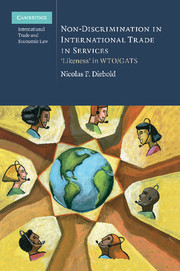Book contents
- Frontmatter
- Contents
- Foreword
- Acknowledgements
- Abbreviations
- List of Cases
- List of Legal Texts
- List of Documents
- Introduction
- PART I Foundations
- PART II Framing the conceptual breadth of ‘likeness’ in GATS
- PART III GATS specific ‘likeness’ issues
- PART IV Methodology for the ‘likeness’ analysis in GATS
- Bibliography
- Index
PART II - Framing the conceptual breadth of ‘likeness’ in GATS
Published online by Cambridge University Press: 10 January 2011
- Frontmatter
- Contents
- Foreword
- Acknowledgements
- Abbreviations
- List of Cases
- List of Legal Texts
- List of Documents
- Introduction
- PART I Foundations
- PART II Framing the conceptual breadth of ‘likeness’ in GATS
- PART III GATS specific ‘likeness’ issues
- PART IV Methodology for the ‘likeness’ analysis in GATS
- Bibliography
- Index
Summary
Having established the asymmetric impact test as an appropriate standard for ‘less favourable treatment’, the question becomes whether ‘likeness’ should be interpreted on the basis of an economic, objective or subjective standard and how it should be analysed in a specific case. While part I concluded that, in the abstract and on the example of GATT, an economic framework is appropriate with regard to ‘likeness’ in WTO non-discrimination rules, part II seeks to confirm this conclusion by analyzing the concept of ‘like services and service suppliers’ in the specific GATS provisions and its interpretation in relevant GATT/WTO jurisprudence. Once the appropriate standard and conceptual breadth has been established, it will then be possible in parts III and IV to derive from these conceptual considerations concrete criteria that can be applied in a specific case.
For an interpretation and discussion of ‘like services and service suppliers’, it is indispensable to take into account the WTO adjudicating bodies' interpretation of ‘like products’ in GATT MFN and national treatment. In EC – Bananas III the Appellate Body held that it is correct to interpret the GATS most-favoured-nation obligation on the basis of previous GATT practice relating to the interpretation of GATT MFN treatment. Accordingly, the following analysis of ‘likeness’ in GATS national treatment in chapter 5 and MFN treatment in chapter 6 is each preceded by a detailed overview of how the same problem in the respective GATT provision has been interpreted by the adjudicating bodies.
- Type
- Chapter
- Information
- Non-Discrimination in International Trade in Services‘Likeness' in WTO/GATS, pp. 101 - 102Publisher: Cambridge University PressPrint publication year: 2010



